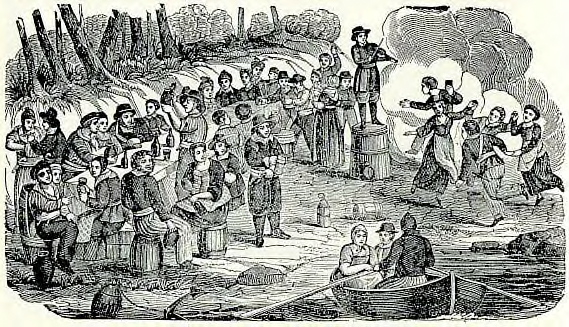
Bad Guys and Good Subjects:
an Anthropology of Power and Law
Office:
HSC 354.
Email
(use sparingly, please): Dylan.clark {{ at
}} utoronto.ca
Office hours (use judiciously, please): Tue/Thr/Fri 1-2:30, and by appointment.
North Building 286, Fridays 10AM-noon.
In this course we will explore the growth of a "modern" regime of crime and rights, and seek to explore how the expansion of rights is linked both to governmentality and to new vectors for power. In other words, we will be looking at how people in many places increasingly govern themselves, how they align themselves with concentrations of power, and how freedom and rights are ideas which allegedly secure space from power, and which may play roles in harnessing and augmenting power. These directions of thought will lead us to a study of the emergent forces of neo-liberalism. We'll pay special attention to the work of Michel Foucault, particularly with regard to his work on criminality, law, and order; and we'll try to assess some of the shortcomings of his work. We'll also be scrutinizing the "state" through an anthropological lens. What, we will ask, is a state, and how do subjects and communities negotiate, manifest, and contest "its" presence?
Required books. Please purchase:
*
Foucault,
Michel.
1975 [1977]. Discipline and Punish. Alan
Sheridan (trans). NY: Vintage.

(ISBN-10: 0679752552) (About $15 online) (OLD Vintage EDITIONS are fine! Even the page numbers are the same.)
**
*
Foucault,
Michel. 2001. Power
(Essential
Works of Foucault, vol. III). James D. Faubion and Paul Rabinow
(eds), Robert
Hurley (trans). Berkeley: University of
California Press.
(ISBN-10:
1565847091) ($15 online)
*
Scott,
James C. 2009. The
Art
of Not Being Governed: An Anarchist History of Upland
Southeast
Asia. New Haven, CT: Yale Univ. Press.
(ISBN-10:
0300169175) (About $17 online)
* We may also have handouts and readings available on Blackboard, on the UT library system, and on the Internet.
BOOKS
AND
Course grading: midterm exam 20%; final exam: 40%;
research
paper: 20%. homework, quizzes, and participation (combined):
20% (ratio
of 6 percent for attendance, 6 percent for oral contributions
and
positive, respectful impact on class, 7 percent for
unannounced
quizzes.)
Written quizzes are possible on any day of
class.
They will be based on the current reading
only, not on
previous reading. This course
requires a
lot of reading. If you are unable to read a lot for this
class, you
should consider dropping
the
course. If you miss a quiz, there will not be a make-up. No
make-ups,
that
is, except for emergencies and religious holidays (as approved
by
diversity officer on campus).
Attendance: Students are
expected to attend all classes, including lectures and
tutorials.
Punctuality: You are expected to arrive and be settled
in your
seat by the beginning of class or tutorial and to remain until
the end
of class, or you will only receive partial credit for tutorial
attendance. Unless you become ill, do not begin packing up
books or
stand to leave before the end of class or tutorial, because
this is
distracting to all. If you know you cannot stay for the entire
period,
please sit near the door and leave very quietly.
Courtesy in Class: Every student is expected to pay
close
attention in the lecture or film. Refrain from talking during
lectures
and films, except to ask or respond to a question from the
instructor.
Even quiet talking is distracting and disrespectful for your
fellow
students and your instructor. Turn off pagers and mobile
phones. In
tutorials, your undivided attention and courtesy is also
expected;
however, this is your opportunity to discuss what you are
learning in
class with your TA and one another. You are encouraged to
thoughtfully
ask and answer questions, but please, no confidential,
whispered
conversations. Anything you say should be directed to the
class as a
whole.
Please
remember that office
hours are limited
and that there are only so many hours to divide between
hundreds of
students.
Please do not bother to explain your missing presence, your missing papers, etc. Generally
speaking,
something came up and you missed class. It is your
responsibility to
get notes from another student. Back up your computer files,
start
projects long before they are due, and study hard. You will
not be
excused from your work: just get the job done. In severe
situations
(death in the family, disabling illness, etc.) provide written
proof.
If you qualify for accommodations because of a disability,
please submit to me a letter from the proper UTM authorities
in a
timely manner so that your needs may be addressed. UTM has
procedures
to determine accommodations based on documented disabilities.
If you
have religious scheduling concerns, please report these in the
first or
second week of class. I will do my utmost to respect
disabilities and religious
issues if they should arise.
MID-TERMS and FINAL EXAMINATIONS
Both the mid-terms and the final exam will consist of multiple
choice
and short answer questions on ALL materials presented in the
class and
discussed in tutorial (readings, lectures, AND films).
The final
exam will not be cumulative. However, materials reviewed again
in
lectures will be a part of the final exam.
*MISSED EXAMS*
Avoid missing an exam - the procedure for taking a make-up
exam is
strictly regulated by the university, and these policies will
be
followed in all cases. Please notify the instructor by email
or phone
as soon as possible if you miss an exam.
* For the Mid-term Exam, see Section 7.9 Term Tests in the UTM
Calendar
for 2009-2010. A valid doctor's excuse or similar
university-approved
excuse will be required to take the make-up for the mid-term.
ONE
makeup will be given for the mid-term, the week after the
regular exam.
All makeup exams will be short answer format only, not
multiple choice.
* For the Final Exam, see Section 7.14 Examinations in the UTM
Calendar
for 2009-2010. You will have to submit a petition to Registrar Services, among other
requirements,
and re-take the exam during the Deferred Examinations Period
(possibly
Feb. 2010 during Reading Week, or
as
otherwise scheduled by the university). All makeup exams will
be short
answer format only, not multiple choice.
PLAGIARISM on exams and written work: You may get
lecture or
tutorial notes from other students for days when you are
absent, but
the answers you submit must be your own independent work.
Exercises in
which duplication is detected will be severely penalized. For
more
details, see Academic Honesty; and the Code of Behaviour
on Academic Matters in the UTM Calendar for 2009-2010 under
Code of Behaviour on Academic
Matters. It is your
responsibility to be familiar with this code, and adhere to
it.
IF you have any questions about what is or is not plagiarism,
please
see www. Plagiarism.org. Students
will
be required to submit their
course essays to Turnitin.com. Instructions will
be
provided. By now you should be aware that the university
expects
your work to be done independently. The university takes
this
issue very seriously. Any attempt to gain undue
advantage over
your classmates by plagiarizing or other forms of cheating
will be
dealt with according to the Code of Behaviour
on Academic Matters. The terms that apply to the
University's use
of the Turnitin.com service are described on the Turnitin.com
web
site. For further information you can refer to http://www.utoronto.ca/ota/turniitin/Conditionsof%20Use.html
LATE EXERCISES: (1) Late exercises will be penalized
per
calendar day, including weekends (Turnitin.com will register
the
time/date of your submission). The penalty is 3%
on the
first day late, then 1% per day thereafter.
________________________________________
Notes on reading:
* Read both text and illustrations, except as noted.
* Do not fall behind. The reading is too challenging and
too
extensive to cram before an exam. Moreover, participation in class is
important to the success of the course.
Course Calendar:
(
January 6 "Truth and Juridical Forms," (Power:
1-90)
January 13 "Body
of
the Condemned," (D&P: 3-31);
"Spectacle of the Scaffold," (D&P: 43-7, 55-63, 67-8)
January 20 "Generalized Punishmen," (D&P: 73-90. 98-103);
"The Gentle Way
in
Punishment," (D&P: only 125-31);
"Complete and
Austere Institutions," (D&P: only 251-56);
"Illegalities
and Delinquency," (D&P: 266-82; 285-8; 290-92)
January 27 "The Politics of Health in the 18th C," (Power: 90-105);
"Omnes et Singulatim," (Power: 298-325)
February 3 "Docile
Bodies,"
(D&P:
135-69);
"The
Means
of Correct Training, (D&P: 170-94)
February 10 "Panopticism," (D&P: 195-228; see illustrations in the middle of the book too); "The Carceral," (D&P: 293-308)
Feb. 24. No class: READING WEEK (optional: Scott,
chapter
1. Probably a good idea to get started on Scott early).
March 2 "Bandits, States, and Power," (excerpt from Eric Hobsbawm, 1969. Bandits, London: Weidenfeld & Nicolson, pp. 7-18); "Hills, Valley, and States: An Introduction to Zomia" (Scott: 1-39); "A Caribbean Cycle of Rebellion" and Rebellion of the Hanged," (excerpts from Peter Linebaugh and Markus Rediker, 2000. The Many-Headed Hydra: Sailors, Slaves, Commoners, and the Hidden History of the Revolutionary Atlantic, Boston: Beacon. pp. 193-8 and 206-10.) "What would it take to knock down these walls?" (excerpt from, David Graeber, Fragments of an Anarchist Anthropology, Chicago: Prickly Paradigm, pp. 53-64); "Pirates, 'Colonial Tribes' and Maroons," (excerpt from Eric Wolf, 1982. Europe and the People Without History. Berkeley: Univ. of California Press, pp. 154-7).
March 9 "Hydrarchy: Sailors, Pirates, and the Maritime
State,"
(excerpt from Peter
Linebaugh
and Markus Rediker, 2000. The
Many-Headed Hydra: Sailors, Slaves, Commoners, and the Hidden
History
of the Revolutionary Atlantic, Boston: Beacon, pp.
143-73;
"Civilization and the Unruly" (Scott: 98-126)
March 16 "State Evasion, State
Prevention:
The Culture and Agriculture of Escape" (Scott: 178-219);
"Orality,
Writing, and Texts" (Scott: 220-237)
March 23 "Ethnogenesis: A Radical Constructionist
Case"
(Scott: 238-282); "Conclusion" (Scott: 324-38).
March 26 (Monday). Term papers due. (Topics
posted on Blackboard) Please submit on UTM Submit.
March 30 Excerpts
from Marshall Sahlins, 2008. The
Western Illusion of Human Nature. Chicago: Prickly
Paradigm Press. pp. 1-4, 88-112; Pierre Clastres, 174
(1977) "Copernicus and the Savages" and "Society Against the
State," Robert Hurley
(trans.), cha. from Clastres' Society
Against the State. NY: Urizen Books, pp. 1-18 and
159-85. Pierre
Bourdieu, "Utopia of Endless Exploitation: The Essence of
Neoliberalism," (about 6 short pages). 
April 12 (Thurs). Final exam. 9AM-noon. Gym C. 3 hrs. Cumulative (but with post-midterm focus), mostly essays. Please submit suggested questions on Blackboard.
Updated, March 12, 2012.
images:
Top: A landscape from Zomia
2nd: Foucault gesticulating
End: pirates celebrating.